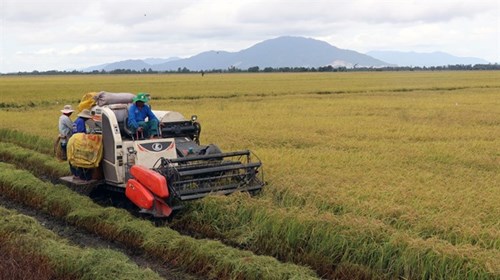The region, the country’s rice granary, has planted more than 4.4 million hectares of rice this year, down by 63,500ha against last year, according to the Ministry of Agriculture and Rural Development’s (MARD) Plant Cultivation Department.
    |
 |
|
Farmers harvest the 2018 summer-autumn rice in Kien Giang Province’s Hon Dat District. (Photo: Vietnamnews) |
However, the yield has been 5.95 tonnes per hectare a crop, up 338 kilogrammes against last year.
Farmers have also shifted many rice areas to higher-value crops like vegetables and fruits, according to representatives of the region’s 17 provinces and two major cities (Can Tho and Ho Chi Minh City).
Speaking at a seminar held in the Mekong Delta province of Kien Giang last week, Nguyen Chi Thien, deputy director of the Long An provincial Department of Agriculture and Rural Development, said the province was reducing the number of rice areas and shifting them to other crops.
This year, about 7,000ha of rice areas were shifted to fruit tree cultivation in Long An.
The province has developed 94 large rice fields with a total of 16,538ha this year, meeting 33 percent of its target, according to its Department of Agriculture and Rural Development.
The region has been developing large rice fields to secure outlets and higher profits for farmers, but the rate remains low, according to MARD’s Plant Cultivation Department.
The department in cooperation with MARD’s plant protection department has improved food safety and hygiene standards for export.
This year the rate of certified rice seeds accounts for 78 percent of the region’s total sowed seeds.
The region has also used more specialty fragrant rice and high-quality rice varieties, and most of the rice is now being planted and harvested with machinery.
Le Quoc Doanh, Deputy Minister of MARD, said the southern region’s production of key products like rice, fish and fruit achieved good results.
In the 2018-19 winter-spring crop, the southern region will grow 1.65 million hectares of rice, including 1.57 million ha in the Mekong Delta.
MARD’s departments will give guidance to localities about planting schedules, disease control, and market demands.
Source: VNA